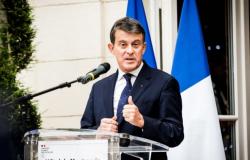Here, in Vahibé, we are in an area known to be sensitive and generally very isolated. Many people suffer injuries, often due to flying metal sheets. Many children walk barefoot in the debris at the risk of dangerous injury. So, our EMSP team goes to meet them. These doctors and nurses, who work at the Mayotte hospital center (CHM), are having their first Red Cross experience. It was Roxane, their colleague and team leader who motivated them. After their very first hours working under our emblem, they testify.
Angelique and Nicolas
Angélique Dumontier is 26 years old and works in tourism. His companion, Nicolas, is a resuscitation doctor and works at Mamoudzou hospital. Arriving on the island at the beginning of November, the couple was to stay there for 6 months. But in one week, their daily life changed…
Angélique: “I’m not a doctor, and I didn’t know how to help. Roxane came to talk to us about the Red Cross, but I didn't know what role I could play there. Finally, I had several small missions today: identifying wounds, injuries, taking care of and directing patients, and being vigilant to secure the area and helping with dressings. We have our life here. All these people who no longer have a roof over their heads, nothing to eat, we met them before the cyclone and it is important to show solidarity with them. »
Nicolas: “I experienced this morning both well and painfully. Good because we were well received and it's important to see what's happening and to meet people. But painfully because it's difficult to see people in this situation. We want to do more but we are limited in terms of possibilities for action. We expected the injuries, but what we fear is finding them later in the hospital in critical condition because there, we did the bare minimum with dressings and disinfection. But we know that if they do not go to centers in the coming days, it could degenerate and end in amputation. »
Elisabeth et Guillaume
Elisabeth is a palliative care doctor. With his partner Guillaume, a pediatric intensive care doctor, they have always been donors and supporters of the Red Cross, but without committing themselves as volunteers. Today is a first.
Elisabeth: “It's normal and important to help when you're well, when you have a roof over your head. But we would like it to go faster, it's a little frustrating. People have nothing left. They say to us “thank you for being there”, so that comforts us when we face the feeling of not being able to do enough. Being there and people seeing that help is coming is already something. We show them that we are witnesses to the abnormality of what they are experiencing. For us, acting today is ultimately the footing we were missing. Being a volunteer was part of our plans, it’s a reality. »
Guillaume: “This morning, I had a feeling of need to get closer to the population who do not travel to health centers. It's an isolated population in the bangas, so you have to go towards them and try to get as far as possible. This is important even if they are small wounds, because they are all wounds at risk of secondary infections. Perhaps by intervening as we do with cleaning, if the person then goes to a health center as we advise them to do, we can avoid complications that could be fatal.”
Camille, a gynecologist, was on duty that night at the maternity ward: “I can't stay at home without doing anything, so I'm coming. Little bandages may not seem like much, but they are also therapeutic education. People understand that feet need to stay clean and dry. Some will understand that follow-up is necessary. I don't feel there as a caregiver but as a helper. The care we provide, everyone can do it. I want to help in this chaos. At the hospital, we help but when I'm not working, I can't stay at home twiddling my thumbs.”
Céline is a nurse anesthetist. She is on contract for 3 months at CHM: “I was going to have breakfast at the boarding school, and I was told that there was a car leaving, so I left. It's good but it's nothing at all what we're doing, they really need care, they need to go to the hospital. It's frustrating, but that's what it is, contact and comfort. »





